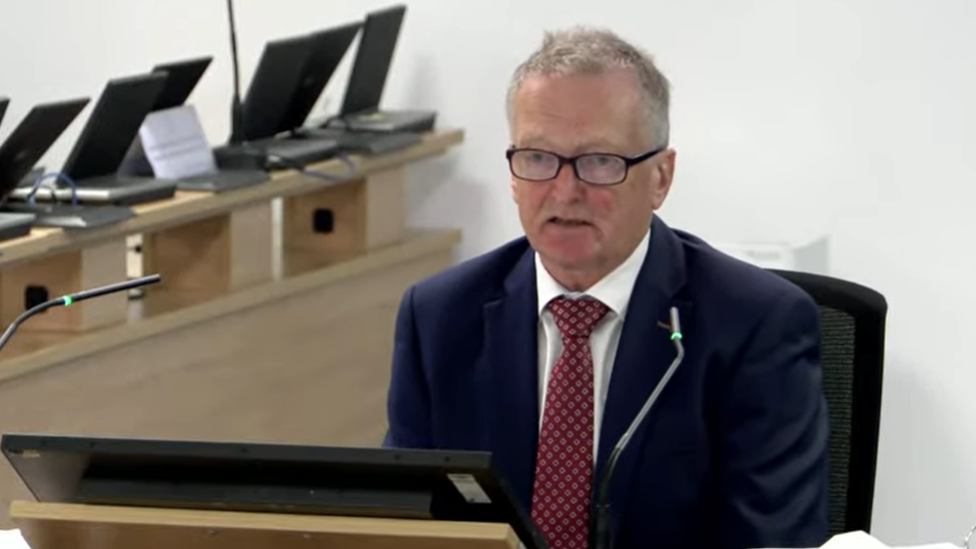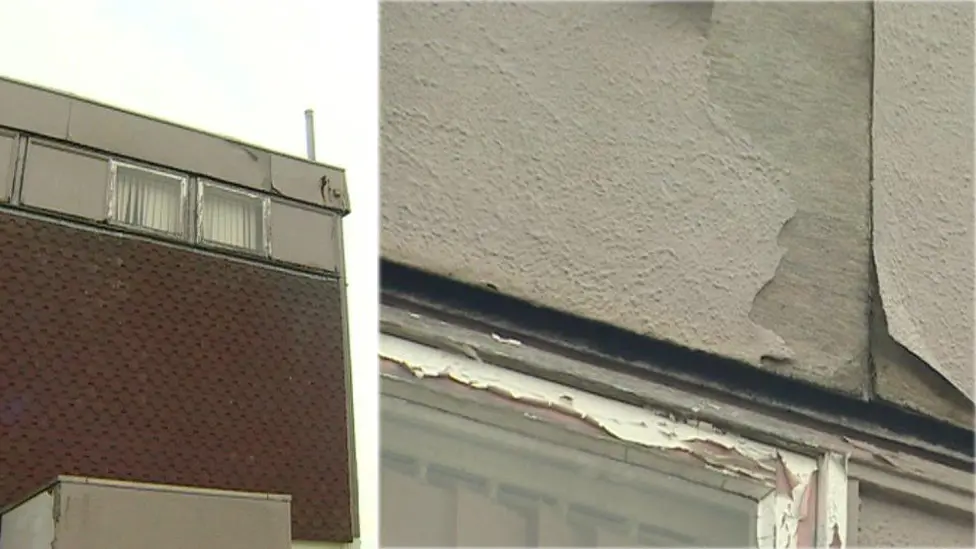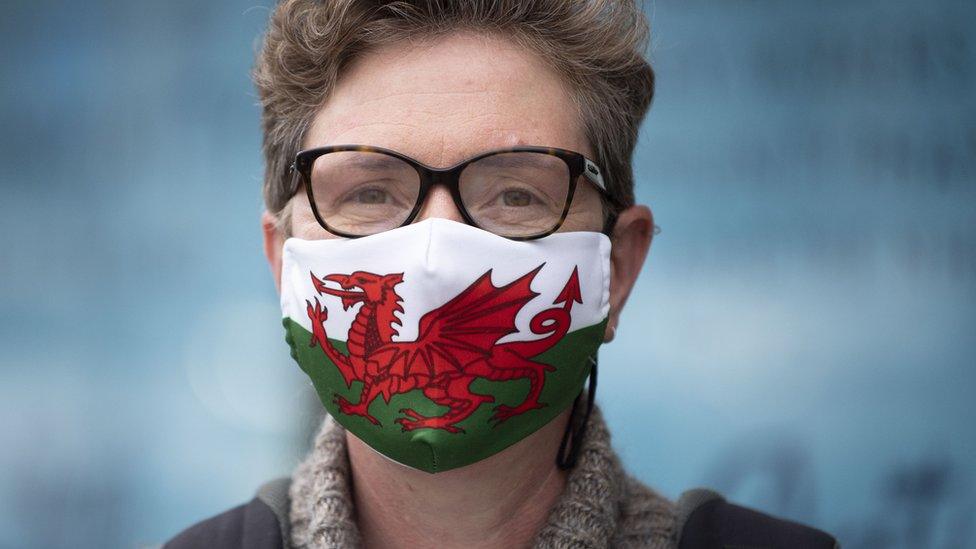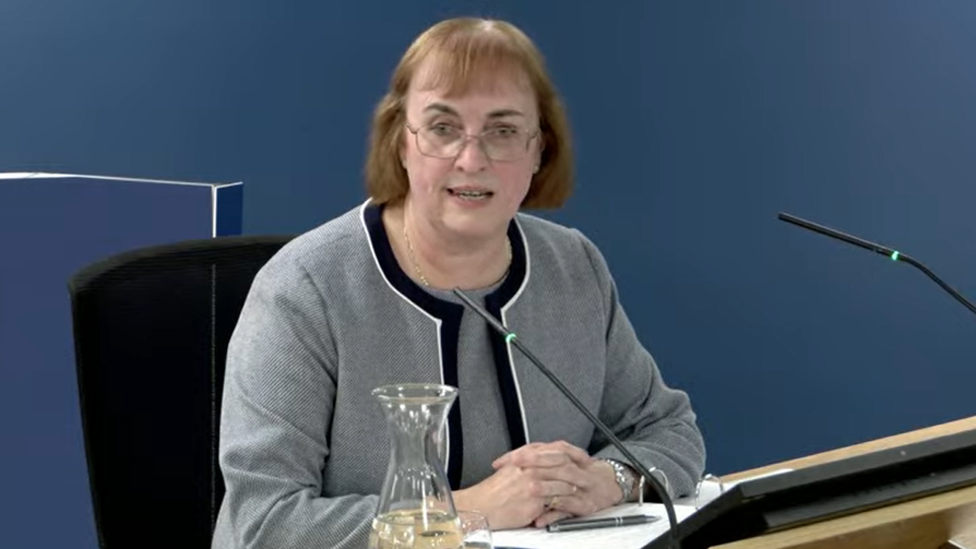Ageing hospitals affected pandemic - Covid inquiry

Frank Atherton says the NHS came very close to running out of PPE but kept the supply moving
- Published
Ageing hospitals and too many different data systems affected how the NHS dealt with the Covid pandemic, Wales' top doctor has said.
Hospital medical directors were “bending over backwards” to manage ageing estates, reconfigure space and to deal with waves of patients coming into hospital, chief medical officer Sir Frank Atherton told the UK Covid inquiry.
When trying to pull together groups of vulnerable people for the shielding programme, health officials were faced with marrying up details from 12 different data systems.
He said there was still a huge job to ensure a simpler system was in place for any future pandemic.

This is part of a hospital building in north Wales, now nearly 50 years old
Dr Atherton said it was widely understood that hospitals in Wales were not as modern or as adaptable as they need to be.
A lot of them were very old, dating from the 1960s and 70s.
“Following infection, prevention control was a real challenge for many of our hospitals,“ he said.
He said medical directors were “bending over backwards” to manage ageing estates, reconfigure space and to deal with waves of patients coming into hospital.
By mid 2020, there was a widespread recognition that a better ventilation was part of infection prevention and control.
But the age of hospitals did not always make that easy.
On identifying those who were vulnerable and extremely vulnerable for the shielding programme, Dr Atherton said it was a difficult and technical job.
Dr Atherton said a very elaborate technical process was needed to identify all those vulnerable and extremely vulnerable people for shielding, working across 12 different data bases.
“We didn’t have an IT system in Wales which could very rapidly identify those people.
"There was a huge amount of work that had to be done by Digital Health and Care Wales to try to marry up the IT infrastructure and different databases to identify those patients.”
Asked if there were now systems in place to respond more rapidly in setting up a shielding programme in any future pandemic to , he responded: “No, I don’t if I’m honest. There’s a huge job in terms of improving the digital connectivity of the various data bases we hold.”
Dr Atherton was also asked about the difficulties in controlling hospital-acquired Covid within hospital, and whether the infection control guidance was sufficient.
There have been 25,000 so-called nosocomial Covid infections in hospital recorded since March 2020.
The chief medical officer said it was impossible to eradicate infections caught by patients while in hospital – that was true before the pandemic and also during it.
Dr Atherton said a rigorous application of evidence-based policy with health boards could reduce them as much as possible.
But the only way of eradicating hospital-acquired infection completely was to close the hospital.
He said a rise in infections didn’t mean that something had gone wrong with the infection control measures themselves.
Without the Welsh government's nosocomial transmission group (NTG) – which operated for two years until the end of March 2022 - he suspected the levels of hospital-acquired infections would have been "much worse", with less advice and support to health boards in managing them.
'River of information'
Dr Atherton is the final UK chief medical officer to give evidence in London at this stage of the long-running inquiry.
Earlier on Monday, he said he was part of a group overseeing 21 different Covid cells – each looking at different aspects of the pandemic.
But he had no secretarial support early on in the pandemic, so minutes were not taken of meetings with other UK chief medical officers and Public Health Wales although he said he tried to keep his own notes.
It was April 2021 before an additional deputy chief medical officer, Dr Gill Richardson, was appointed alongside his existing deputy Dr Chris Jones.
He said they were under-resourced.
“There was a huge amount going on at the time, there was a river of information that was flowing extremely fast," he said.
"It was very difficult to maintain an understanding of that and at the same time keep the administration of the office in place.”
Dr Atherton said he recalled a conversation with his opposite number in Scotland, Dr Catherine Calderwood, about the way his office was structured and she was horrified "at the resource we had to deal with the issues we were facing".
Asked at what lessons could be learnt for any future pandemic, he said there needed to be greater capacity in the NHS to respond.
"That's because we've tried to make our NHS as efficient as possible. It's about how we can expand our capacity... for all sorts of things."
He said they had managed to double the number of intensive care beds during the pandemic to 300 - but they needed the staff trained to be able to move into these positions.
Related topics
- Published28 May 2024

- Published16 March 2024

- Published17 September 2024
